by Jenny Rose | Jul 5, 2018 | Power
“Always forgive your enemies; nothing annoys them so much.”
― Oscar Wilde
It’s been a chaotic week for me of fear, memories, fire, grief, a couple of new friends and unfinished emotional business resulting in a foul snarl of neglected feelings. Also, in common with millions of others, we are sweltering under a heavy blanket of heat and humidity and I feel about as attractive as a slime mold.
My old home place, my old community in Colorado, is burning. I’m not there. I’m glad I’m not there.
I should be there. I hate myself for not being there.
I’ve written before about blessing the ground between us. Now my mind is filled with the ground I once lived on, and all I can see are the horrifying images of flames, smoke, and the ashy remains of structures and scorched land. I spend hours every day searching the web for updates from local command and incident centers, the local papers, TV and radio and residents who post pictures and videos. I watch interviews with old friends and weep. I see video clips of my town and it’s like a ghost town, the streets empty and everything looking sere and dry because of drought. Towers of smoke loom and the air is an eerie sullen color. This should be the height of the tourist season there, the streets busy, flowers growing, and shade trees green and cool.
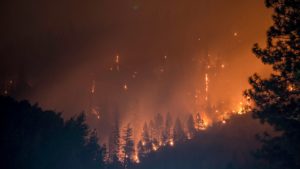
Photo by Matt Howard on Unsplash
Now there are tens of thousands of scorched acres between me and my memories of that place. I bless the ground between us. Given time and water, it will renew, but I think water is no longer a certainty and my lifetime will have run its course before the land recovers and the forests regrow. In a strange sort of way, the desolation of all that scorched earth echoes the desolation I feel as I watch nations, communities, and people become more divisive and competitive. It seems we’re getting more and more skilled all the time at scorching the ground between us, soaking it in blood and then sowing it with salt. We do not forgive differences. We carry hatred between peoples from one generation to the next, and many are at work in the world to increase the divisions by fanning the flames with rhetoric and disinformation, and pouring gasoline onto the fire in the form of resentment, ignorance, and fear.
We do not forgive. We are not forgiven.
Never have despair, powerlessness and fear seemed so darkly seductive to me as they do in these times. My experience is only an infinitesimal part of what’s happening now on Planet Earth, and I’m quite sure we have not yet descended as far as we’re going to. At times, it’s only by deliberately stoking my stubbornness and will and refusing to take my gaze away from where my power is that I continue to cling to faith in some kind of a cosmic balance and plan in spite of fear.
I’ve been spending a lot of time recently thinking about my family and dealing with some of the aforementioned unfinished business. I’ve written letters, both to the dead and to the living, some that have been sent and others that never will be. As I make new friends, I listen to what we talk about, watch how we get to know one another and feel the flowing give and take of compassion and support healthy female friendships create.
“I wondered if that was how forgiveness budded; not with the fanfare of epiphany, but with pain gathering its things, packing up, and slipping away unannounced in the middle of the night.”
― Khaled Hosseini, The Kite Runner
Over and over again, in all these places in my life, I stumble upon the theme forgiveness: The power of it; the terrible, helpless pain of feeling unforgiven; the weapon we make of it; the fear we will not be — cannot be — forgiven for whatever our particular stain or shame is. I have lately asked myself and others: Am I unforgivable? Can that be true? Can love be true without forgiveness? How do I continue to demonstrate love and connection in the face of obdurate unforgiveness? When others told me I was unforgivable, did they mean it, or am I still bleeding over something they have, in fact, forgiven?
It struck me this morning, as I lay in bed at 6:00 a.m. with the rattling roar of the window air conditioner in my ears and the damp sheet over my sweaty body, I’ve once again lost my way, been seduced by the false comfort of victimhood. I’ve been lost in the tangled maze of all those messy feelings and forgotten, temporarily, the point is not what anyone else does about forgiveness. The point is, and the power resides in, what I do with it. Furthermore, the biggest question of all is the one I haven’t been asking.
Can I, do I, will I forgive myself?
That’s where my power is.
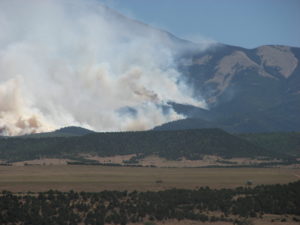
East Peak Fire, Huerfano County, CO 2013
Can I forgive myself for living in this lovely green, lush, landscape where we do still have water? Can I forgive myself for reading the signs of what was to come in the long, unending drought and fires in my old place and leaving before I was forced out by climate change and fire? Can I forgive myself for the mother, daughter and sister I was and am? Can I forgive myself for loving, trusting, hoping, believing, trying, accommodating, pleasing and failing? Can I forgive myself for all the years of neglect, silencing and abuse I colluded with and perpetrated toward myself? Can I forgive myself for now recognizing and responding to my own feelings and needs first? Can I forgive myself for writing or speaking the simple truth?
Forgiveness is a slippery concept, like tolerance. I don’t think of forgiving as forgetting. I’d be foolish to forget what I’ve learned as I interact with others. I’ll cripple myself if I don’t forgive. For me, forgiveness is an integral part of loving. Forgetting is not. Nor do I equate forgiveness with trust. Trust can be lost and rebuilt, but it takes time. Trust depends on forgiveness, but forgiveness doesn’t necessarily include trust.
I’m not at all sure we can create a better world together without forgiveness. I’m quite sure we won’t forgive one another if we’re unable to forgive ourselves. As resources shrink, we’re going to be forced onto a more level playing field in terms of our standard of living. Some of us have a lot more to lose than others. The have-nots are filled with rage. The haves are filled with fear.

Photo by Evan Kirby on Unsplash
There will be a lot to learn in the years ahead. I might as well start now to work with forgiveness, to befriend it, to embrace it, and to talk about it. Forgiving and letting go are both easier for me to do externally than internally, but internal work is the one place where we all have equal power. That’s where it must begin. We’re going to need our power, and we’re going to need to manage it well in order to survive. When our houses, businesses, cars and stuff disappear in fire, storm and flood, when our arable land becomes too hot to grow food, when no water comes from the tap and when money no longer allows us to pretend it’s not all happening, then we will rediscover what true power is, and then perhaps we can begin to bless the ground between us, forgive what has come before, and find new ways to collaborate and cooperate with the living system we call Earth.
In the meantime, I think I’ll stop begging others for forgiveness and concentrate on the places where I have power. Others may think of me as unforgivable, but I needn’t agree, and no one can prevent me from forgiving another.
“The weak can never forgive. Forgiveness is the attribute of the strong.”
― Mahatma Gandhi, All Men are Brothers: Autobiographical Reflections
My road to self-forgiveness may be long. It’s hard to take back the power of forgiveness, because now I have to be responsible for granting or withholding it. In some ways, it’s easier to beg others for it. If it’s not forthcoming from others, well, it’s not my fault. The path of self-forgiveness, though, is all up to me. It will be interesting to discover what sort of shame, guilt and self-loathing lurk in my internal terrain. It will be interesting to challenge the power of what others think and navigate by my own stars and compass. It will be interesting to put out fires on my side and observe whether others are invested in keeping them smoldering or assist in quenching them so the ground between us can heal.
Here’s a poem by Wendell Berry mapping the journey of self-forgiveness. It’s a good map. I’m taking it with me.
Do Not Be Ashamed
You will be walking some night
in the comfortable dark of your yard
and suddenly a great light will shine
round about you, and behind you
will be a wall you never saw before.
It will be clear to you suddenly
that you were about to escape,
and that you are guilty: you misread
the complex instructions, you are not
a member, you lost your card
or never had one. And you will know
that they have been there all along,
their eyes on your letters and books,
their hands in your pockets,
their ears wired to your bed.
Though you have done nothing shameful,
they will want you to be ashamed.
They will want you to kneel and weep
and say you should have been like them.
And once you say you are ashamed,
reading the page they hold out to you,
then such light as you have made
in your history will leave you.
They will no longer need to pursue you.
You will pursue them, begging forgiveness.
They will not forgive you.
There is no power against them.
It is only candor that is aloof from them,
only an inward clarity, unashamed,
that they cannot reach. Be ready.
When their light has picked you out
and their questions are asked, say to them:
“I am not ashamed.” A sure horizon
will come around you. The heron will begin
his evening flight from the hilltop.

Photo by Yuan Yue on Unsplash
All content on this site ©2018
Jennifer Rose
except where otherwise noted
by Jenny Rose | May 24, 2018 | Emotional Intelligence, Feelings
Sometimes being a writer is a pain in the ass.
I had several ideas for this week’s post, but when it came down to it all I produced was something I didn’t want to think about, remember or write about at all. I tried to stop and go back to one of my original ideas, but no matter where I went I ended up in the same place.
I’m old enough to know it’s much easier to ride the horse in the direction it’s going, so I’m writing the damn thing, but I want you to know I’m resentful about it.
Two seeds contributed to this piece. The first is that my partner will be attending his fiftieth high school reunion this summer, and deciding whether or not to accompany him has been a thing for me.
The second seed is the latest (as of this writing) school shooting in Santa Fe, Texas, and the story about the girl (who was killed) who allegedly rejected the shooter and how that may or may not have been part of the motive.
I don’t know what happened between these two young people, of course. I certainly don’t believe everything I read. Perhaps the shooter was bullied. Perhaps he wasn’t. Maybe the girl simply said no, and some people interpret that as bullying. Maybe he refused to take no for an answer and the girl was trying to get the message across with ever-increasing force. I’ve been in a position like that myself. I don’t know, and for the purposes of this post it doesn’t matter.
I think we all can agree we have a problem with school shootings in this country, even if we don’t agree on causes and solutions. I also believe the data gathering, debate and problem solving around this issue is extremely important. Along with everybody else, I have my own opinions about how we got here and what we might do about it, but my opinion isn’t part of this post, either.

Photo by Alex Iby on Unsplash
The reason I’m writing about it (the shooting, one of the alleged triggers for the shooting, and the entire problem of school violence) at all is because of the way it makes me feel.
Sick. Sad. Scared. Angry.
These are the same feelings I’ve had about the entirely trivial decision about whether or not to attend my partner’s high school reunion.
My days in high school were a black time I’ve worked hard to forget. I led a strangely reversed life then, like a photographic negative. My real life was the volunteer fire and rescue work I was doing, my family (including many animals) and reading, the frame around the central core of school. The fire and rescue work often took place at night, of course, and I well remember the fellowship, the macabre hilarity, the practical jokes, and the heartbreak, terror and death we saw on the highway. There were impromptu middle-of-the-night meals at Denny’s after delivering a patient to the hospital, when we were stinking of gasoline and had glass splinters in the knees of our jeans. I was the baby, the youngest, but I was trained and certified and did everything I could to pull my weight.
It was the first time I ever felt I belonged anywhere, or was of any use to the world.
School days, by contrast, were endless bleak hours of clocks, bells, the metallic slam of lockers, figuring out what was necessary in order to maintain straight A’s (which thankfully did not involve much attendance in most cases), and fatigue.
I can’t remember eating a single school lunch in either junior high or high school. Isn’t that strange? I must have, but I have no memory of doing so, or of the cafeterias. What I do remember is the high school library, where there were rows of study carrels — remember those? They were 3-sided square boxes on the desks so that each student was cut off and private, in his or her own little undistracted and unobserved space. I had one particular favorite, the farthest away from the librarian and activity, out of sight, out of mind. It was where I slept. I wore an old hand-me-down men’s quilted navy blue coat that I cherished, and I wadded part of it up as a pillow, pulled the rest over my head and slept for long stretches through lunch and classes.
I was (and am) very organized. I knew what my teachers expected. I always showed up for tests and did all my homework. Papers and projects were planned and completed well before they were due. I did all the reading, homework and classwork. If extra credit work was available, I did that. When I could take AP classes, I did. I never ditched AP English, which I loved. I also went to Latin, another favorite. German was fun, too. I was never any kind of a problem, in class or out of it. Most of the time, I was numb with boredom.
I wished only to remain invisible and maintain a 4.0 grade average. The invisibility was for myself. The grade average was because it was expected of me, and it was easier to just do it than to rebel. Also, I wanted to be finished with school as soon as possible, and the quickest way out was to pass all my classes.
Most of the teachers and all of the students were alien species. I moved among them like a ghost, a wisp of fog. I hardly opened my mouth. I occasionally raised my hand in class for the teachers who required participation for an A, but I’d learned in grade school not to volunteer too many answers, even if I did know them. I dawdled over my tests so as not to be the first one finished. I took pains to keep most of the teachers at a distance so as not to be identified as a “teacher’s pet,” another lesson from grade school.
I was never bullied, though I saw and heard bullying every day. I was adept at blending in and attracting no attention, positive or negative. I didn’t hate the other kids. I didn’t think much about them at all. I didn’t hate the teachers. I even respected a couple of them. I was angry all the time, but it wasn’t focused on anyone in particular, and I only recognize it in retrospect. I didn’t blame the teachers, the kids or my parents for the hell I was in. It never occurred to me there was any other option. Everyone had to go to school, period. My parents were busy people with lives of their own. There wasn’t anything they could have done and I saw no point in whining and complaining.

Photo by Milada Vigerova on Unsplash
The school day was bracketed by a 40-minute bus ride morning and evening, and I did my homework on the bus, which effectively shut out the noisy horseplay, teasing and other socialization happening on it. I always chose a window seat somewhere in the middle and immediately set to work, never looking up from my notebook and books even if someone sat down next to me. If I had no homework, I read.
When I was a senior I finally learned to drive, somewhat unwillingly. I’d seen too much trauma on the highway by then to be enamored of driving. In the end, though, I learned and sometimes I drove our old Chevy truck to and from school, a battered tank of a thing that could cope with any kind of weather and wouldn’t crumple like a tin can at the slightest bump or ding. It was a faded brick red. If I had the truck, I abandoned the library and stretched out on the seat to sleep after parking on a quiet side street, cracking the windows and locking the doors. It felt very safe.
I do remember, as a great treat to myself, buying lunch in town when I had the truck, either at McDonald’s or a little health food store that made wonderful egg salad sandwiches.
Sick. Sad. Scared. Angry.
I remember one student I graduated with. One. I think I remember him because he was also a friend of my brother’s, who was a year behind me, and he was on the summer swim team with me. He was in my AP classes and became a scientist. He wasn’t a friend. He’s just the only one I remember.
On the other hand, I remember the fire station very well, and the rescue barn. I remember the smell of exhaust from the ambulances and big trucks. I remember the little offices where the phone and radio sat on the counter. I remember the meetings, the folding chairs, the scarred tables and the pancake breakfasts. I remember the battered coffee urns and the stained sinks, the water fights, the endless and hilarious practical jokes, the laughter, the weekly meals at the local diner, the parties, the trainings and the people. I later married two of the men I volunteered with in those days (not at the same time, of course!) I remember running up and down ladders for training, the impossible weight of portable water pumps (we called them Indian pumps) for fighting brush fires, the eerie sight of burning trees crowning in a blossom of flame against a dark sky and watching a house burn to the ground. I remember the sour smell of cooling “hot spots” after a brush fire. I remember the live feeling and weight of a charged firehose, enough to knock me over, and the way it peeled the shirt off you during a water fight.
For this treasured, meaningful part of my life, though, there was no acknowledgment. Rather the reverse. It wasn’t quite nice, a teenage girl running around with a bunch of older boys and rowdy, often bawdy volunteers, never mind that I took First Aid, CPR, EMT and IV training and loved it all. It also meant I occasionally showed up in the company of the police at wild parties where someone got hurt or overdosed, which did not endear me to my high school peers. Not to mention that the first dead body I ever saw happened to be one of my schoolmates. I’ll never forget the broken-doll look of him as he lay on the highway, broken glass glittering in his hair under the emergency lights. The only reason it was possible for me to do that work was that my mother did it too. She was quite a good paramedic, in fact.
My experience with high school took place in the late 70s and early 80s. We had a completely open campus. Certainly, things are different now in terms of security, at least. I wonder, though, how many kids are sitting in public schools across the country this very minute who are largely unseen, unheard and simply trying to survive.
Every time a shooting happens we get hours and hours of interviews, social media posts and videos of parents, teachers and students and their perceptions of the perpetrators, and I always wonder — did anyone, does anyone, can anyone really know their student, brother, son, teammate or classmate? How well does a high-school-age kid know him or herself? How much perspective can they have, how much experience in the amazing ways life can change over time? What has been their experience of connection with themselves and others? What is the level of their willingness and ability to communicate? Have they ever, in their whole lives, been given a reason to believe asking for help or telling the truth is useful, rather than making everything much, much worse?
My family cared about me. I remember going to counseling once or twice, both in school and out of it. Do you know what happens to kids who get in-school counseling? They get pulled out of class, right in front of God and everyone. Every single student and teacher in that class knows where they’re going. Not exactly a help when you’re trying to remain invisible. Also, the counselors are just as worn-out and frayed as all the other adults in a school, with an endless array of troubled kids, emergencies, difficult or distraught parents, and they’re trying to support the teachers as well. I was ashamed to be part of their burden and take up any of their time.

Photo by John Salvino on Unsplash
We say some of these at-risk kids who become shooters are identified and “in the system,” and I think many components of “the system” have an honest desire to make a positive difference and work usefully with young people. That doesn’t mean the young person is able to avail him or herself of the support, though. I trusted no one at that point in my life. I wouldn’t have ever told the truth about my private thoughts and feelings. I’d already learned the danger of rocking boats, and I also knew I was privileged because I was smart, we were comparatively wealthy and I had a family that loved me. I had nothing to complain about, and I didn’t. Nothing would have induced me to shame my parents and my extremely intelligent, talented and much more normal and attractive younger brother.
Now, thirty years later, kids are dying, and teachers, and school staff, as well as an occasional parent. We’re trying to understand. Some are trying to find someone to blame, as though that fixes things. But the parents of the shooters aren’t killing these kids. Neither are teachers or security personnel. Bullies and peers aren’t killing these kids. “The system” isn’t killing them, either, or the NRA. The one who pulls the trigger is the killer. I think it’s important to be clear about who’s ultimately responsible. The question is, what came before the trigger was pulled? What are all the intricacies and complexities leading to that moment of choice, and how do we begin to explore that terrain without the input of the shooter, who might or might not survive, and if alive, might or might not tell? If we can ever fully understand, how do we make changes in the roots of parenting, emotional intelligence (or lack thereof), public education (so-called), and our culture’s broken sense of connection and ability to be authentic?
If my school records could be magically produced, what would they show? Straight A’s. Honors student. Maybe a counseling note or two: Isolated, frequent absences, no behavior problems, no sign of abuse or cutting, not a danger to self or others,

Photo by Joshua Fuller on Unsplash
People, that’s a paper doll, not a person. I’m smarter than most people I know. If I’d been a danger to self or others (and I was a certainly actively suicidal), do you think I’d have told anyone? Come on. I know we have social media now, but how much of what shows up on a teen’s social media is Truth? Teens compete, exaggerate, dramatize and make stuff up, just like the rest of us. Often there are clues, but they’re a lot easier to see after the fact, and that’s not much help, is it? It takes years to develop self-knowledge and insight, even if we’re willing to.
Sick. Sad. Scared. Angry.
I’m a parent. When my two sons were teenagers, I worked at the same school they attended. It was a small school and I knew every student, every staff member and most of the parents. I had a whole reality in my head about who my kids were and how they were doing. I loved them with my whole heart. I absolutely trusted them. I frequently knew when they were ditching school, smoking weed or leaving the house in the middle of the night. I didn’t bail them out of consequences or micromanage them. I was a single mom, working desperately hard to keep us afloat and trying to deal with my own experience.
I knew I wasn’t okay, but I wanted to believe they were. I was doing the best I could, loving them as hard as I could and making sure they knew it.
They did know it, just like they knew I wasn’t okay. They weren’t okay, either, but they knew I was doing my best, they didn’t want to burden me and they didn’t really know what they needed for things to get better anyway. Exactly the same position I’d been in two decades earlier.
The truth is, given the right circumstances, either of my boys could have been victims — or shooters. So, in fact, could I. That’s a hard thing to believe and a harder thing to write, but it’s true. Every single one of us has a snapping point, whether we admit it or not. High school can be a place of prison and torture, a place of no hope, an infinite incarceration, a daily experience of humiliation or fear. It can be a nihilistic experience, a daily exercise in powerlessness, in making oneself small, in concealment, in survival.
Sick. Sad. Scared. Angry.
And then there’s the other side of high school. Some amazing people in every class go to endless work and trouble to keep track of their classmates and plan and organize class reunions. For someone like me, this is both astounding and appalling. When my partner told me about his reunion this summer and asked me to come with him, it took me a minute to understand he was serious. Sure, and then can we go get our legs chopped off with a dull blade? Please, oh please?
But I know many people have great memories of clubs and sports teams, teachers and classes, proms and homecomings. My partner has lifelong friendships from high school. Imagine it, 50-year-old friendships! I met my closest friend when I was 30. What would it be like to have that kind of history with another person, that kind of intimacy? What would it be like to know someone liked you enough to be friends with you for 50 years?
Sick. Sad. Scared. Angry.
High school. Guns and reunions. Looking for quick, inexpensive, politically attractive fixes. Heated debates. Demonstrations and walk-outs. Active shooter drills for schools and law enforcement and mass trauma drills for hospitals. Blameshifting, fear, mistrust, profiling. Blood, vigils, funerals and graves. Bullying, mental illness and lasting trauma. Lost kids. Disconnected kids. Dead kids.

Photo by Cristian Newman on Unsplash
The cacophony of debate, press conferences, social media, opinions, interviews, political maneuvering, nonstop news feeds and raw videos goes on and on, and somewhere in the center of the maelstrom is the core of the problem — the young people who shoot, who die and who witness. Some of them have been swept into the hurricane, but I wonder how many are simply sheltering in place, trying to survive another bewildering, hopeless, pointless day of tech, teachers, rules, grades and peers. I know they’re there, because I was one. They could tell us a lot about futility, despair and disconnection. They’re keeping painful secrets. Are we willing to hear their truth? Do we deserve their trust? Do we have time or energy for them? Can we change anything for the better? Or would we tell them to get over it, that everyone has to do things they don’t want to do, that high school will be over one day? Do we paste a neat label on them and write a prescription? Do we insert them into a “system,” because that’s the best we have, and turn away to deal with our own jobs, responsibilities, stresses, scar tissue, labels and prescriptions?
I’m back where I started.
Sick. Sad. Scared. Angry.
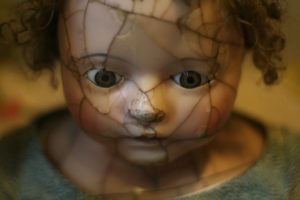
Photo by Aimee Vogelsang on Unsplash
All content on this site ©2018
Jennifer Rose
except where otherwise noted
by Jenny Rose | May 17, 2018 | Contribution, Emotional Intelligence
The seed for this post was a podcast by Pat McCabe, also known as Woman Stands Shining, who is a Diné (Navajo) mother, grandmother, activist, artist, writer, ceremonial leader and international speaker. In the podcast, she speaks about the idea of making an offering as part of our spiritual work.
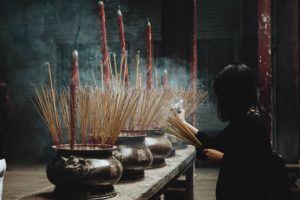
Photo by Chinh Le Duc on Unsplash
That idea started me thinking about offerings, what it means to make one, to whom we make them, and why. Spiritual and sacred practices are a strong theme in my Webbd Wheel series. Mother’s Day has come and gone and Father’s Day is ahead. Many of us mark these days with offerings of some kind. For Earth Day, I joined a small neighborhood group and picked up trash, and I framed that activity as an offering. Yesterday I cleaned up my summer-only dance space and danced there for the first time this season. As so often happens, during that hour of dance this week’s post crystallized.
An offering is “a thing offered as a gift or a contribution” according to a quick Internet search. A gift is “a thing given willingly to someone without payment.”
The act of making an offering is ancient, a practice we began long before we could go out and buy a gift. Various cultures have historically engaged in ritual sacrifice (an act of slaughtering an animal or person or surrendering a possession as an offering to God or to a divine or supernatural figure), an altogether different degree of gift from a cute coffee mug.
I’ve long struggled personally with gift giving. There’s something in me that resents and resists the cultural mandates we’ve created to give gifts of a particular kind on certain occasions or days of the year. It seems to me modern-day gift giving has moved away from making an offering and into a demonstration of possessing money and spending it on some new piece of something, just for the look of the thing. We may feel real love, or gratitude, or whatever, but the only way we know how to express it is by buying a card (never mind the trees) and some kind of a gift.
I know that’s how we do things, but what does it accomplish, aside from contributing to our capitalist economy? Is that what we most want from the people in our lives — more stuff — or is that what we take because we can’t get what we really want? Is a coffee mug all we think we have to offer? Is a coffee mug all we think the other will accept? Are we unable to recognize and cherish an offering unless it comes gift-wrapped?
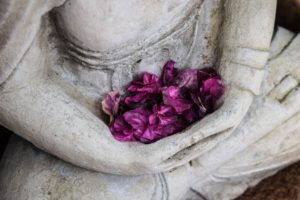
Photo by Chris Ensey on Unsplash
I’m thinking a lot about Pele, the Hawaiian volcano goddess, because I’m writing about her in my second book. Traditional offerings to Pele included tobacco, brandy, silk, crystals, tropical flowers and food. Offerings to Pele and other divine figures around the world involved ritual, prayer, music, song, dance and sometimes a sacrifice. Things, yes, although many were consumables or objects from the natural world, but also time. Presence. Creative, sensual and/or erotic expression. Community celebration, guided by spiritual leaders. Reverence. Appreciation. Gratitude. Acknowledgement of the Divine’s connection to the people and the natural world they inhabited.
Making an offering on this level is a demonstration of commitment and willingness to participate in the complex web of connection between people and nature. It’s a practice, not a one-time event. It’s flexible and not limited to the calendar or the clock. If there’s a community or individual need to speak to the Divine, time is set aside to do so. No money or commerce need be involved, because the offering is of self.
The offering of self, however, is often invisible, especially to our nearest and dearest. It’s so fatally easy to take one another for granted. The very act of feeding those we love is an offering we’ve been making and accepting since humans began. The acts of growing, harvesting, gathering, hunting, sharing and preparing food, absolutely necessary for survival, are almost obscured now by money and time constraints, ecological concerns, health issues, ideology and who does the dishes. Whether we recognize it or not, feeding another person is an offering of life. Parents know making that single offering to just one child, let alone other family members, is a colossal, exhausting, unending task. Yet it’s so often completely invisible, and who has time to enjoy the act of offering food to another (or ourselves, for that matter), or incorporate ritual, play or creativity into our eating? It’s just another chore in our busy days.
So, if our offering is invisible, unrecognized, unappreciated or even rejected in favor of something like a coffee mug, does it mean we’re worth nothing, we are nothing?
Of course not, but it feels that way sometimes, doesn’t it?
Making an offering means letting it go into the world and having faith in its worth. An offering is a gift, and a gift is a thing given willingly, without payment, remember? There isn’t a scorecard. It’s the practice of offering that enriches our spirit, not the outcome. Unfortunately, everything about our modern culture trains us to depend on immediate reinforcement. We’re hooked on likes, claps and our stats. We gloat over the number of our friends, subscribers, comments and shares. Deadliest of all, we compare our popularity and performance with the popularity and performance of others.
What others think about us and how the world perceives us is becoming more important than our own integrity and the authenticity and quality of our offerings. We’re forgetting how to trust and have faith in silence, in invisibility and in not knowing. We’re forgetting our worth is not defined by others.
What about the offerings we make to ourselves? What about our ability to meet our own needs, spiritual, physical, creative and emotional? Do we have any self to give ourselves? Do we tell ourselves there’s no time, no money and no point? Do we tell ourselves whatever our self-expression is, it’s not worth anything, meaning we can’t sell it to someone or no one will approve of it?
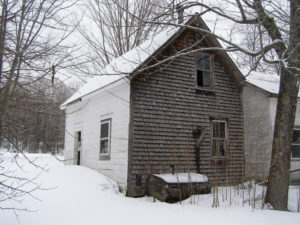
Woodshed
I danced yesterday in an old woodshed that was attached to a local one-room schoolhouse more than 100 years ago. It leans and tilts. The roof leaks. The windows and doors aren’t square and the wind blows through gaps. I swept out the winter’s accumulation of mouse and bat droppings, leaves and dirt. It was a warm, sunny day and as I danced I gradually peeled off my clothes until I was naked. The sun came in the west window and made a square on the floor.
I thought of trees and stones offering their bodies to moss and lichen, the earth offering itself to plants, and blossoms offering themselves to sunlight and insects.
I thought of smiling into a stranger’s eyes and complimenting a cashier on the color of her blouse.
I thought of the creators of the music I was dancing to making an offering of their talent, enabling me to offer my dance.
I thought of homes, rooms and gardens I’ve created that are long erased. I thought of people I’ve loved with my whole heart and volunteer work I’ve done. I thought of my partner, who was running an errand in town so I could eat bacon the next morning. I thought of picking up trash on Earth Day and the new trash that’s been thrown out car windows since then, and how futile that makes me feel.
I thought about words, all these words, all these stories and ideas and thoughts in my head that are here and in my books. I thought about all the words written by others I read each day and appreciate and share.
I thought about procreation, the red tide and the milky seed our bodies offer to life, to hope, to continuance. I thought about offerings of tears, of blood, of pain, of rage and of surrender.

Photo by Leon Liu on Unsplash
Offering is a circle. Life offers itself to us, and we can choose to offer ourselves to Life. What better offering can we make than our fully engaged participation and presence with ourselves, our experience and others? Such a gift can’t be bought or sold. It might not feed our fame, popularity or bank account. We probably won’t get validated by statistics or Twitter. Some people may never recognize or value it.
But our self-esteem will bloom. Our joy will increase. Our words and choices will add to the positive energy in the world. We will become self-empowered and spiritually strong and resilient.
I smiled and laughed and shouted as I danced, whirled and stamped and clapped. I offered up my white, winter-tender skin to the sun and air. A mosquito bit me on a knee; a blood offering. No one saw me, except maybe an astonished spider or two. No one cared. It was an offering of self to self, a private thing. It gave me joy. It gave my body a chance to move and be grateful. It fed my creative well.
It was nothing.
It was everything.
It was my offering.
All content on this site ©2018
Jennifer Rose
except where otherwise noted
by Jenny Rose | May 10, 2018 | Connection & Community, Emotional Intelligence, Shadows
Slowly, I’m finding online communities of writers. As I’ve shaped Our Daily Crime, I’ve connected with other bloggers. These connections mean I spend at least an hour a day reading the work of others. I’m inspired, touched, tickled and provoked, and I feel at home in these digital communities because we all share the need to write and be read. We also share self-doubt, confusion, vulnerability, loneliness, the need for connection and the problem of earning a living.
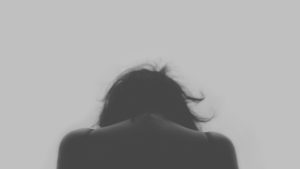
Photo by Volkan Olmez on Unsplash
Over and over again, I read about personal struggles with depression, fear and anxiety. Many a writer sits down to their daily writing practice with goals and intentions and finds him or herself unable to do anything but express the here and now of their experience of ambivalence, avoidance, distraction or block. To be a writer is to occasionally live with shame and guilt about what we meant to write, what we should have written and the quality and subject of what we actually did come up with. We all doubt our ability, our value, and whether anyone will care enough to read our words. Creative expression is a daily leap of faith.
I’ve struggled all my life with depression. In more recent years, I’ve come to understand anxiety and fear are also large parts of the feeling I recognize as depression. Over the years I’ve tried to manage depression in many ways. Some worked, at least temporarily, and some didn’t.
It hasn’t been until the last decade that I’ve finally found a way to effectively manage and even largely banish depression. It doesn’t play with me anymore. Fear and anxiety still show up regularly, but the same method works to manage them, and I no longer worry one day I’ll just give up, step over some unseen edge, and disappear into crazy, a fugue state, or death.
One day, for no reason in particular except I felt exhausted, despairing, and bored with both, I said to Depression, “You win. I give up. Why not come out of the shadows and show yourself?”
Fat and happy, secure in its power, it did just that.
The first thing that I realized was Depression is an experience, not an integral piece of me. It’s something draped around me. It can be separated from me.
The second thing I noticed was my depression is male. He walked with an arrogant male strut and swagger and he spoke in a male voice.
I didn’t name him because he wasn’t a pet, he wasn’t a friend, and he most definitely wasn’t invited to be a roommate. He was merely someone who showed up at more or less regular intervals and made a nuisance of himself. He didn’t have the manners to knock on the door, wait to be invited or give any notice of his arrival. He just appeared.
I wondered what it would take to discourage him from visiting. What made me so attractive?
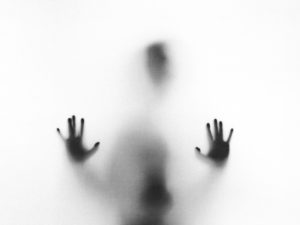
Photo by Stefano Pollio on Unsplash
Clinical depression is like a grey cave filled with fog. It numbs the senses and fills head and heart with cold, sticky, lumpy oatmeal. One is entirely alone with no hope. The simplest action, like opening one’s eyes, takes enormous effort. Depression envelopes and consumes every spark of power.
The only reason I’m in the world today is because I’m an unbelievably stubborn butthead. I’m also very nice. One does not cancel out the other, but nearly everyone persists in missing that second important point, with the result that I’m constantly being underestimated. This is a wonderful advantage in life.
Depression was no exception to the rule. When invited, he disentangled himself from me, parked his butt in a chair I pulled out for him, and began to tell me how things were going to be from now on.
On that particular day, I hadn’t showered (or the day before that, or the day before that). Annoyed by his high-handedness, I interrupted to say I was going to shower. He told me not to. Who would care? What was the point? I wouldn’t see anyone. No one would see me.
That was all I needed. I went and took a long shower. Washed my hair. Shaved my legs. Put on clean clothes and some jewelry. Depression sat in the bathroom and muttered at me. I ignored him.
I felt better then, and my irrepressible creativity began to stir, along with a childlike streak of playfulness I usually keep well-hidden. One small act of rebellion had helped me regain a tiny sense of power.
One of the things that used to happen when depression struck was that I stopped eating. I’d go all day with nothing but a salad and a piece of toast. I hadn’t eaten a solid meal for several days on this occasion. I wasn’t the slightest bit hungry (this is common), but I knew I needed to eat.
Depression didn’t like it. He threatened and complained and trotted out all the usual points. I was too fat. I hadn’t been doing anything useful and didn’t need to eat. I didn’t make enough money to deserve to eat.

Photo by Florencia Potter on Unsplash
I put a chair at the table for Depression (I lived alone at the time), invited him to sit, set the table for two with complete place settings, right down to two glasses of water, made myself a meal, and ate. I offered him some food, but he refused. I read while I ate and ignored Depression, who sat and sulked.
Well, you have the idea. The more he protested when I wanted to take a walk, sit in the sun or work in the garden, the more stubborn I became. I politely invited him to join me in my activities, but he refused, which meant the more I got out in the world and did things the less time I spent with him. He hated my movies and my audio books. He thought walking to Main Street for an ice cream cone was a criminal waste of money, along with feeding the birds. The only activity he approved of was my work, which involved sitting for hours in front of my computer with headphones on doing medical transcription as fast and accurately as possible for only slightly more than minimum wage.
He absolutely hated my music. I quickly developed the habit of turning on Pandora first thing every morning and listening to it most of the day.
We also conflicted over sleep. Depression said there was no point in getting up in the morning because no one would notice. No one would care. In fact, the only things really worth doing in life were working and sleeping. This attitude ensured I set the alarm for 5:30 a.m. and walked every day at dawn.
I didn’t ask him to leave. I didn’t fight or struggle. I made sure he had plenty of space and a good pillow in my bed. I gave him a spot at the table and a seat in front of the TV. I took out a clean towel for him and invited him to browse in my personal library.
Every single time he told me not to do something I did it, no matter how much I didn’t want to. I was pleasant, noncompliant, resistant and stubborn as a mule.
You know what?
He went away.
One day, he was just gone.
I knew I’d found the key.
Externalized, Depression suddenly became more pathetic than terrifying. He was so predictable, and so limited. All he had to say were the same things he’d been saying all my life. He was boring. He was like a batty old uncle who must be invited to every family gathering and tells the same interminable stories year in and year out.
He came back, of course, but for shorter and shorter visits at wider and wider intervals.
“Back again, I see,” I’d say. I’d set a place at the table, take out a clean towel, make space in the bed and on the couch. I’d realize I was sliding again and concentrate on eating more regularly, exercising, playing music, putting flowers on the table or maybe scheduling a massage.
I tried to have conversations with him, but Depression had no conversation, just the same tired monologue, mumbling and whining. He was really quite sad. He stopped spending the night and then gradually stopped visiting altogether.
I guess he was no longer getting what he needed from me.
Fear and anxiety are still regular visitors. Things are different here in Maine. I don’t live alone, for one thing. I still play imaginary games, but only in my head. Still, when either fear or anxiety show up, I recognize them. (Anxiety bites her fingernails; I always recognize her hands.) I don’t try to keep them away and I don’t try to hide from them.
I focus on giving them no power. I don’t buy into their catastrophizing. I appreciate they’re trying to keep me safe, poor things. All they can do is make up terrible stories about what might happen and then sit, paralyzed by their imaginings. I know they’re wretched. I wish I could help. I try to be kind — at a distance. They usually don’t stay long.
This experience is the sort of thing I used to hide, but I realize now my struggles are not unique. I’m inspired by the creativity, honesty and vulnerability of other writers. Coping with depression, anxiety and fear is like figuring out how to eat. Every body is different. Everybody needs to find their own path to healing, health and sanity. At times, it’s difficult to break through social expectations and shoulds and make a complete left turn into something creative, intuitive or outside the current norms.
Still, nothing succeeds like success. Turning Depression into an externalized character helped me see I didn’t have to define myself by it. I could choose to set aside that label and all it implies. Once I truly believed I had the power to choose, everything changed.
Sometimes, running away from sudden or passing danger is appropriate. However, running from these chronic spectres dogging my heels has not worked. I can’t get away from them. I can’t avoid or evade. Being chased by anything is fearful. The moment when I stop running, turn around and deliberately go toward whatever threatens me is the moment in which I begin to regain power. Monsters suddenly become mice. My own fear and abdication of power are what made them monstrous. I don’t need to hide. I don’t need to defend. I only need to consistently and patiently demonstrate I will give them nothing they want so they choose to leave me.
It helps when they tell me what to do.
Don’t tell me what to do!
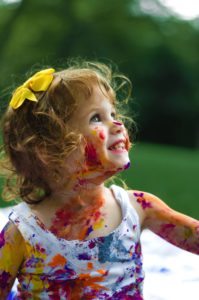
Photo by Senjuti Kundu on Unsplash
All content on this site ©2018
Jennifer Rose
except where otherwise noted
by Jenny Rose | Feb 8, 2018 | A Flourishing Woman, Mind
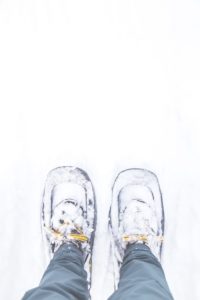
Photo by Dakota Corbin on Unsplash
In the mornings now, I strap on my snowshoes and go down to the river. This is the first time I’ve ever snowshoed, and when I began a few weeks ago I anticipated moving silently and gracefully (as opposed to floundering like a pregnant hippopotamus) through the landscape, seeing the animals that make the tracks rather than just the tracks themselves.
It was a lovely vision.
The reality is that cycles of snow, sun, rain and subzero weather do not create a fluffy blanket on the ground, but a crusty, layered mix of wind-hardened drifts; thick, lumpy ice; and bitter frozen ground. Walking on it, I feel exactly like Sasquatch, lurching and loud. CRUNCH, crunch, crunch, and then CRUNCH and wallow, wallow, wallow and giggle, swear, giggle. If one fails to lift the tip of a snowshoe up far enough, it catches under the top crust and down one goes on hands and knees, thrashing in several inches of cold, grainy powder to regain a standing position and some kind of solidity underfoot. The only wildlife I see is a squirrel or a pileated woodpecker observing me from a high perch, alternately laughing scornfully and scolding.
So much for romance.
My partner and I walk gingerly out to the mailbox or car on the glassy ice in the driveway, taking tiny, tentative steps and testing each before going on. Somewhere, under all that ice, lies a sleeping world of earth, grass, clover and the inhabitants of the soil. I wonder, do they know this very minute more snow is falling on the layer of ice above them? Do they hear our footsteps slipping and sliding, or the click of the crampons we use on our boots or on the bottom of the snowshoes? Do the delicate weights of the juncos eating sunflower seeds off the ground or the footprints of the squirrels as they race from tree to tree, foraging and playing, reach the world beneath the winter skin of ice?
When I arrived at the pool to swim yesterday, an exuberant group of adolescent boys was in the water, shooting balls through a hoop. In a nearby lap lane, I settled down into my usual steady Zen freestyle, letting my mind drift from this week’s blog post to the day’s writing and all points in between. The sun shone in a row of windows alongside the pool, so I swam through alternating bars of shade and light.
Above the skin of water, the boys shouted, yelled, laughed and talked, jumping and splashing, filling the air with the echoing noise characteristic of indoor pools, along with the slap and slosh of agitated water and the sound of balls bouncing off the rim of the hoop or the tiled floor around the pool.

Photo by Jeremy Bishop on Unsplash
Under the water, I entered a different world, a silent world of rippled turquoise light and blue water. As I swam through intermittent sunlight, my shadow reached its arm toward my fleshy arm as I stroked, the two sets of fingers trying to touch. The agitated water rocked me so I had to turn my head farther when I breathed in order to avoid a mouthful of chlorinated pool, but the noise from the world above sounded far-off and muted, nothing but a background for my own thoughts. I didn’t notice when the boys exited the pool and I was alone with the ripples of light and the steady stretch, pull, breathe and kick of my body.
Under the snow lying over the meadows and fields on this land is a world of field mice, shrews and other small creatures. They run through tunnels of last season’s decaying growth, foraging, sleeping, mating, fighting and living their lives. What do they think as I pass over them, a giant in snowshoes on sharp teeth? Do they crouch and cower in terror, or do they feel secure under the thick skin of snow? They surely must mark my passage, but their presence escapes me entirely. Does my weight cave in their tunnels and storerooms? When I fall through the crust am I laying waste to whole communities hidden beneath the snow? Do my footprints provide hunters from worlds above easier access to prey living in the layers below?
In the old tales, heros and fools, youngest sons and tricksters descend. They fall into dreams and oceans, enter wells and caves, go through trapdoors in the floor, climb down beanstalks and step down stairs. They crawl down chimneys or disappear in the red maw of a wolf or the cavernous insides of a whale. They brave cellars and tunnels and dungeons. They find worlds of magic, of mystery, of intuition and wisdom and hidden treasure.
In a lifetime, we travel from the darkness of the womb into the light and back into darkness again. Our experience is layer upon layer of minutes, hours and years. Beneath our skin, hidden in the folds of our exquisite and mysterious brains, are all the things we’ve seen and heard and felt, all the events that have shaped us. Beneath the membrane of our cells is our genetic code, the building blocks from which we are made.
Beneath, and beneath, and beneath.
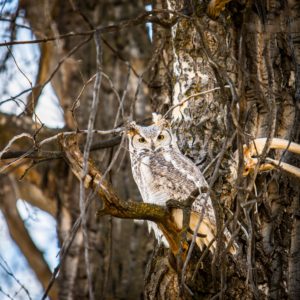
Photo by Laterjay Photography on Unsplash
The worlds beneath support the worlds above. If the soil does not contain the right mix of microbes, minerals and nutrients, trees will not grow. If the rodents leave our fields for quieter places where Sasquatch is not roaming over their heads, the fox cannot survive here. Without both healthy trees and rodents, the owls hidden in plain sight in the tops of the winter trees will starve.
Yesterday I wrote a scene in which I wanted hedgehogs. I paused my writing and turned to the Internet to research. For two hours, I read about hedgehogs, looked at images, listened to audio recordings of their sounds. Now the section is written, the hedgehogs only a small part of the whole, and the vast majority of facts and observations I collected will never appear in the book. They lie beneath the words. No matter. That research, my delight in these small creatures and their private lives, will enliven and enrich the story, even if invisible to the reader.

Photo by Tadeusz Lakota on Unsplash
What lies beneath my skin and yours? What’s concealed beneath the skin of ice, of water, of rock, of soil, of forest and meadow and swamp? What can we learn from those who know how to travel from one layer, one world, to another? How far might we descend, or, for that matter, ascend?
Peering beneath the skin. My daily crime.
All content on this site ©2018
Jennifer Rose
except where otherwise noted






















